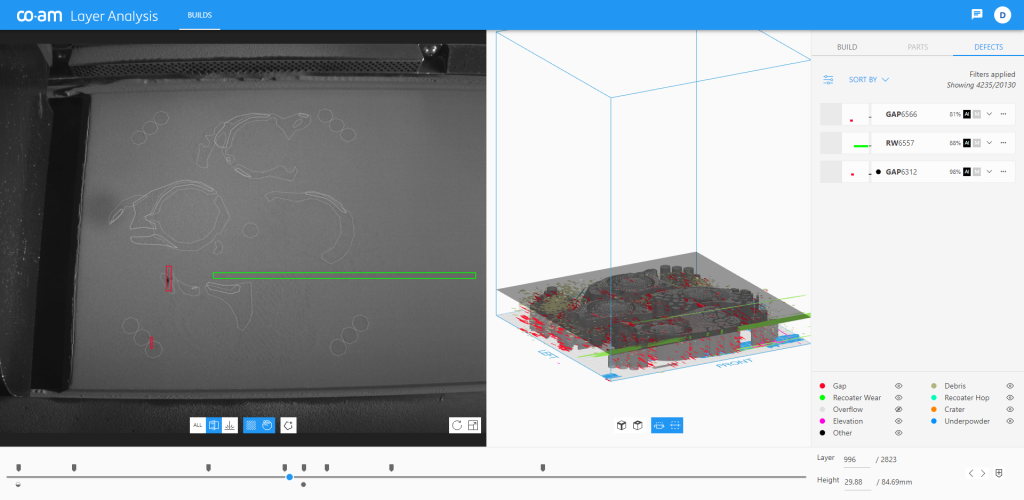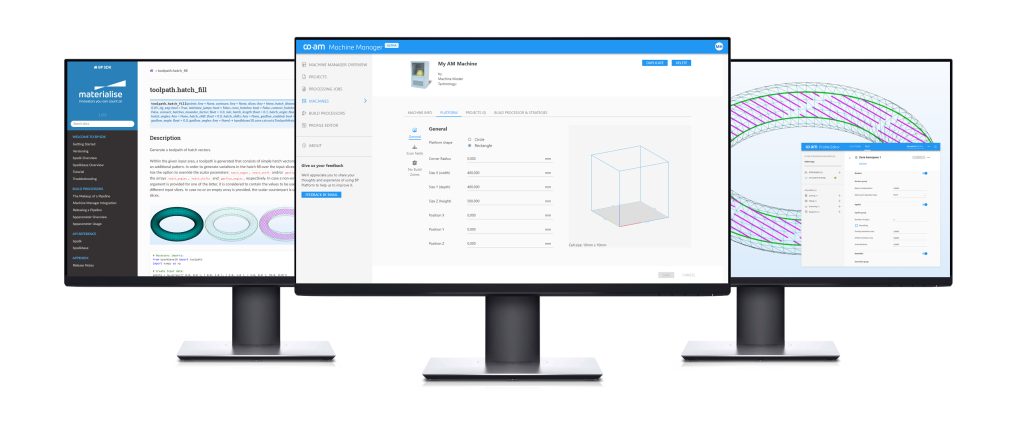Materialise is a global leader of 3D printing software. The new technologies allow additive manufacturing (AM), customers to have complete control over the 3D printing process by using automated quality control and configuring the 3D printer parameters.
“Materialise Process Control uses artificial intelligence to automate quality control, helping our customers save significant time and money,” said Materialise’s CTO, Bart Van der Schueren.
Service providers of AM are under pressure to meet increasing part quality and cost standards. It is essential to control and regulate 3D printing processes. Still, AM users need the right tools to avoid failed builds, hidden flaws in their parts, and 3D printing settings that don’t work for AM applications. These issues can lead to wasted machine time, waste of materials, and increased costs.

Automatic Quality Control: The Advantage
Materialise Process Control allows businesses and individuals to monitor quality through data from 3D printing. Users can identify and correlate layer data from 3D printing to find problems before they go through quality inspection and post-processing. This can increase the part’s cost by 30% to 70%. The layer data can be used to quickly identify the root cause of any errors. This allows them to improve their process and adjust the 3D printing settings. By identifying scrap early and performing a root cause analysis, they can lower the cost of each component. They also reduce the amount waste and the number quality control operations required after processing.
CTO Van der Schueren said, “Through collaborations with partners like Phase3D and Sigma Additive Solutions, AM users benefit from a technology-agnostic innovation that offers unparalleled insights into their 3D printing process for continuous improvement.”
Even though most 3D-printed components are made up of hundreds of layers, it is difficult to evaluate them manually and can lead to human error. Materialise Process Control automates these processes, giving workers more time and the ability to improve the AM process. Artificial intelligence is used during 3D printing to examine 2D photos of powder bed. Materialise works with Sigma Additive Solutions, Inc. (NASDAQ :SASI), to combine additional data and provide a complete understanding of 3D printing. The Phase 3D technology provides height mapping, which is a type of topographic layer data. Sigma Additive Solutions also provides heat data from the melt pool. This is the area where the metal is melted during 3D printing.
Materialise Process Control is both a part of CO-AM, Materialise’s all-in-one 3D printing software platform, and a separate piece of software that can be used independently. Partner can add their monitoring software or software to an open-source solution.

3D Printing Process Improvement
A build processor (BP), links 3D printers with tools such as Materialise Magics, which help prepare data. It manages 3D printer-specific data. Users can modify build settings to speed up 3D printing jobs and determine component attributes such as density and surface quality. Suboptimal parameters increase the cost per component, prolonging build tasks and increasing post-processing.
“More and more AM users want to scale up their activities and serve the demand of quality end-part manufacturing. Very often the standard build parameters of a 3D printer don’t match their needs,” shared Karel Brans, Senior Director Partnerships at Materialise. “They are looking for ways to improve the machine utilization rate and achieve consistent quality. With a BP developed for a specific use case, you can push productivity and quality to a whole new level.”
Previously, it was difficult to build BPs or modify them for particular purposes. The BP SDK offers a flexible way to achieve this. Machine suppliers and manufacturing companies that do research and development can use the development platform as a toolkit, rely on Materialise’s additive manufacturing (AM) skills, or choose to work together. Businesses can use proven BP technology to speed up the process of creating new products, adding their own APIs, or creating new intellectual property. This open-source development approach makes it easier for people and can make BPs more flexible and better at what their do.
The BP SDK allows AM users the ability to install BPs that are tailored to their requirements. A customized BP is used to find the right balance between cost and quality for an AM application. Customers can produce many identical or customized products with the same quality and less waste while requiring a shorter lead-time. 3D printing is becoming more popular and businesses are more likely to adopt it. The BP SDK allows you to build processors that allow you full access CO-AM and Materialise Magics.
Quality Control in Additive Manufacturing
TÜV SÜD, a German technical service company, gave insights into the importance of quality assurance for additive manufacturing and its importance if users wish to reach serial production with AM.
A certification system has been developed for additive manufacturing plants based on DIN SPEC17071. This will make it easier for manufacturers to establish serial additive manufacturing. Because of lack of experience and knowledge, serial additive manufacturing often fails to produce safety components or other regulated items. A detailed description of the manufacturing process and continuous quality control are essential for high-quality parts. It is essential to describe the quality characteristics and testing methods in detail. DIN SPEC 17071 teaches users and manufacturers how they can set up production lines in a matter of months, rather than years. It also explains how to minimize risk and ensure quality. The certification scheme enables manufacturers to demonstrate that they have followed DIN SPEC 17071 and are committed to ensuring quality products to their customers.
3D Printing Industry recently interviewed Hexagon about how the Nexus platform could be used in an industrial 3D printer workflow. Hexagon and Microsoft have teamed up to launch Nexus, a digital platform for manufacturing that lets engineers and manufacturers work together in real-time during all stages of a product’s lifecycle, from design and engineering to production and quality. The platform’s Design for Additive Manufacturing (DfAM) capabilities will be particularly useful to the 3D printing industry, addressing the data silos and limited collaboration that has hampered progress in the sector. Nexus comes with three apps, and new features are being added all the time.
The first “solution” that Nexus adds is for DfAM. It combines Hexagon’s MSC Apex Generative Design software with AM Studio from CADS Additive and Materials Connect over the cloud. Once the design phase has been completed, Hexagon’s Simufact Additive process simulation software runs simulations on the part, checking its manufacturability. This lets the part’s design and build preparation be changed quickly to meet the customer’s needs and ensures it can be made. Nexus’s DfAM also offers an interactive three-dimensional whiteboard, enabling all project members to perform live project reviews with real-time annotation, sketching on the 3D model.
Subscribe to the 3D Printing Industry Newsletter To keep you informed about the latest 3D printing news, follow us on Twitter. You can also follow our blog TwitterLike our Facebook Page, and Subscribe to the 3D Printing Industry Youtube Channel to get more exclusive content
Are you interested working in the additive-manufacturing industry? Visit 3D printing jobs To view available positions and jumpstart your career, click here
Featured image is the Materialise Process Control. Image via Materialise.